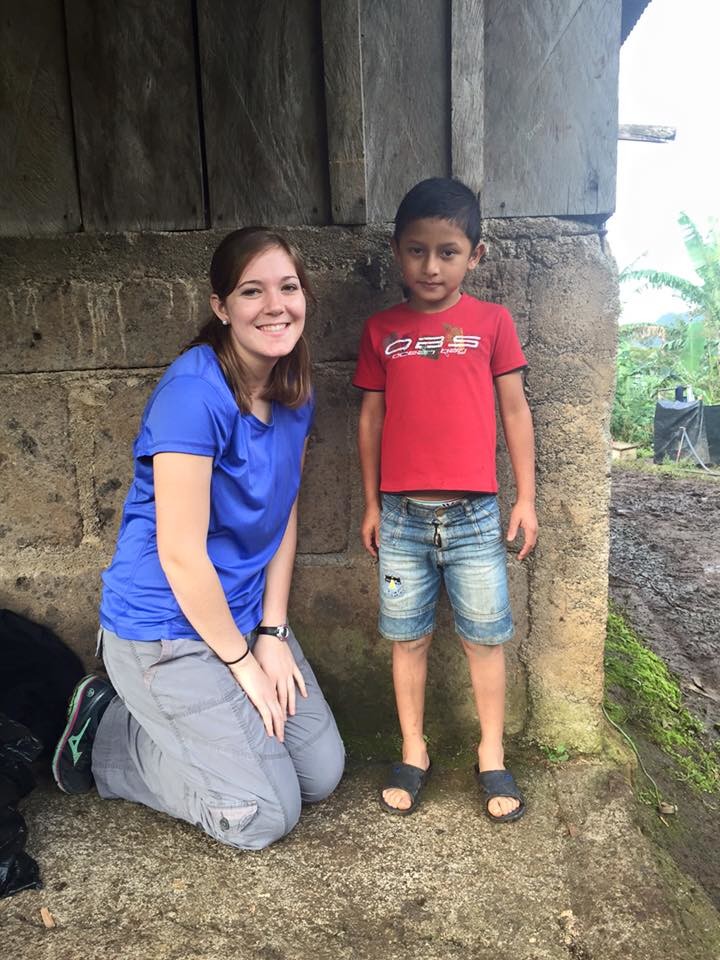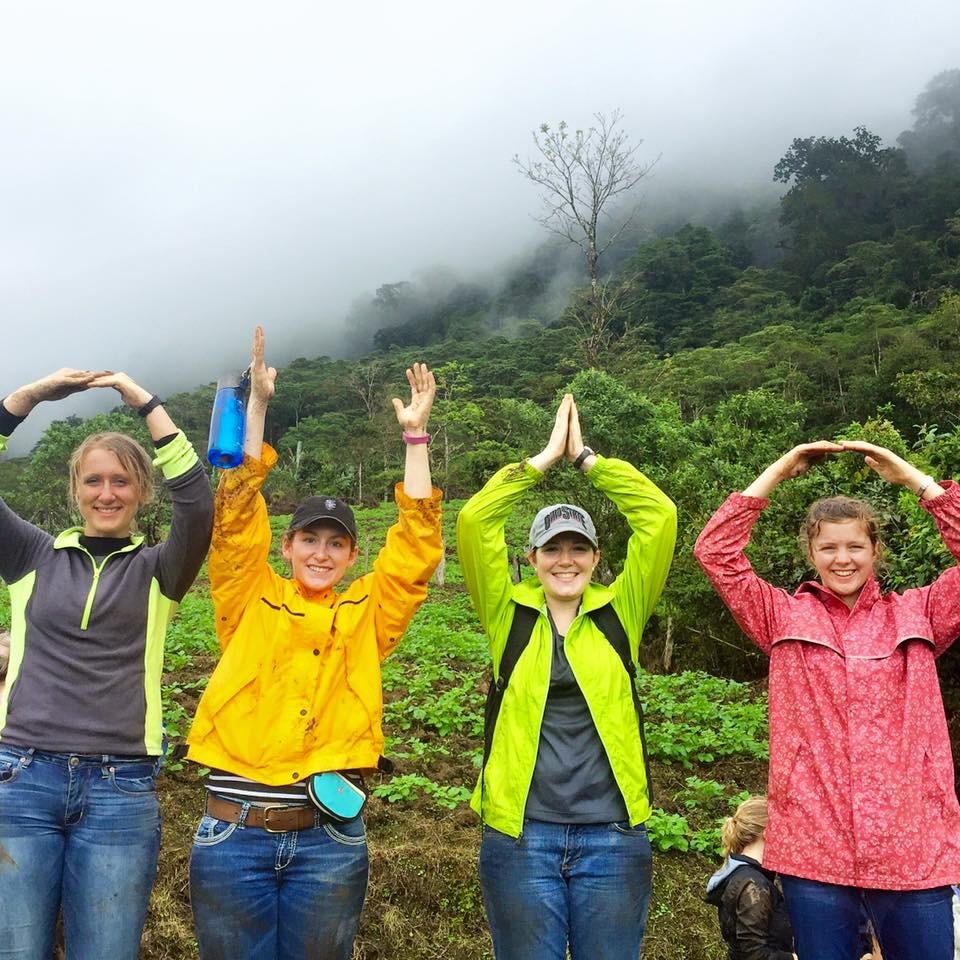Nicaragua
January 1-10, 2016
Driving into the Penas Blancas Mountains of Nicaragua you might first recognize the breathtaking mountains covered in colorful foliage, the muddy dirt road, or the homes and buildings scattered across the countryside. However, after spending time there you will realize it is the people that will stick in your memory.
Just last week I spent two nights in the rainforest with a Nicaraguan family that belonged to a Coffee Grower’s Community and Cooperative. I was fortunate to have this opportunity through signing up for a First Year Experience Study Abroad Program at orientation through the College of Food, Agricultural, and Environmental Sciences. Part of the experience involved splitting into small groups and completing a home stay with a local family. The families we stayed with spoke little to no English, worked full time as coffee farmers, and did the best they could with their low income that required countless hours to earn. These farmers will harvest every day from October to February, at the end of the harvest season they will receive one paycheck that must last for an entire year.
My family lived in a beautiful valley with potatoes, coffee plants, banana trees, chickens, geese, and mountain hillsides with tropical flowers everywhere. Although my group and I were able to communicate in some Spanish, both cultural and lingual barriers still existed. It was through the youngest daughter, an eight year old named Katalina, we were able to form the strongest connection. Just like many eight year old girls in the United States her favorite color was pink, she loved kittens, and her favorite princess was “Nieve Blanca” or Snow White. When we presented the children of the family with a brand new bouncy ball, we had the whole group of us playing. Later that evening the older boys of the family asked if we had “tarjetas” or cards, they soon were teaching a new game similar to Rummy. We shared pictures of our families and helped our host mother make tortillas over the open wood fire. When our host father put up our mosquito nets at night we were there holding the hammer and nails, just like a child would with their father in a rural Ohio home. We may live completely different lives, but we had so many similarities.
Staying with a family of a different culture, socioeconomic status, and completely different language was a humbling and perspective changing experience. We may have walked up a muddy hill to an outdoor latrine, showered with a bucket of mountain water in the open air, shooed chickens out of the kitchen, and witnessed a spider larger than my hand; but our host family lived with incredible dignity and expressed continual happiness. In our country too often we associate personal fulfillment and contentment with the amount of material possessions we own, the house we live in, the car we drive, the job we have, and the friends we keep. Instead, in the quiet mountains of Nicaragua this family was happy for companionship, the beautiful scenery all around them, good food to eat, and a sturdy tin roof over their heads. I am grateful for the chance to learn about another culture, and the reminder of all the things we have to appreciate.
Honduras
May 8-23, 2017
May 8-23 2017, I traveled with a group of students from the College of Food, Agricultural, and Environmental Sciences to Choluteca, Honduras. This education abroad was focused on community development and education. The majority of the students within the group aspire to serve as Agricultural Educators and FFA Advisors in rural communities following their time at The Ohio State University. During our time in country we completed agricultural tours, visited primary and vocational agriculture schools, and completed a variety of service projects such as laying concrete, painting classrooms, preparing and serving meals, and teaching school children how to plant a garden. As students on the trip we each had to create a Photo Voice project, selecting an image that captured the transformational changes, and challenges, we faced in Honduras. My project, titled, “A Shared Reflection” is below:
A messy painting experience and front-facing camera created a warm laugh and an invaluable lesson. When Osman held up his phone, we both were looking at our reflections: our similarities, our differences, and our shared purpose. Almost a week later, I watched the vocational agriculture teacher at Apacilagua share a front-facing camera with his students, this time for a selfie. Once again, their reflections displayed commonalities and variations; however, from an outside perspective, it illustrated awakened potential and an investment.
Education has the power to uplift people and societies for several reasons. But ultimately, it has this power because of those who give the gift of learning and more importantly those who take the time to show others their worth. Witnessing educators in Honduras has left me with more questions than answers, but it also has given me faith that despite the challenges a teacher’s impact isn’t measured by their resources, only by their compassion.
Teaching students with empty stomachs and worn uniforms in a classroom with hot temperatures and zero school supplies is a reality. Having a teacher who treats you like a feral animal, switches you until you scream, only shows up to class two days a week, and continues to receive a government paycheck with 100% job security is also a reality.
Students of this country have dreams that were planted by hearts of the selfless and strong. This week I have witnessed the power, responsibility, and future we all share when we intentionally shine our light onto others.
Costa Rica
March 9-18, 2018
I will never forget the long bus rides filled with fellowship, the beautiful views, the difficult learning moments, or the powerful insight gained from talking with Ticos. Traveling to Costa Rica allowed me to engage in an aspect of agriculture that is not only different from the United States in it’s methodologies, but also in it’s focus. Along the way we had the opportunity to experience a variety of geographical attributes, climates, and ecosystems. Most importantly, we had the chance to learn more about ourselves by completing a home stay in la finca argentina. Ultimately, this education abroad experience helped me to further my cultural quotient indicator, gain Spanish language skills, and become aware to a different, but equally important, form of agriculture.
Staying at the Finca Maria Jose gave me even more insight into Hispanic culture and the reminded my perspective of what truly matters. On our very first day in the community we were the first group to be dropped off, I was so nervous because I didn’t know what was going to happen, and I was going to have to rely on my Spanish skills for the weekend. Instantly we were welcomed into their homes, and the birthday party they were currently hosting. Although at first feeling awkward and out of place, I was able to break the cultural and somewhat language gap by engaging with one of the children at the party. There was a younger boy who had started a game of keeping a leftover balloon in the air, when it wandered over my direction I decided to join the action. Later during our home stay I had the chance to make soap with the daughter of our house mom, and then with our neighbor’s daughter help color and play with puppies. I realized how easy it is to find similarities and have fun with someone who may be so different than yourself.
I definitely was reminded of the “Costa Rican” way and had to remember the importance of patience. I continue to struggle with a culture that fails to plan long term and is okay with taking shortcuts on a job eventually leading to more work later. As a type A person I was raised my whole life with the mantra, “If you have time to do it twice, you have time to do it right the first time.” Being flexible is an attribute I have developed more and more as a college student, I am very detail-oriented and love to have plans made far in advance. But we all know that doesn’t happen, and a lot of last minute changes occur in an agricultural classroom. Thankfully I am working on adopting the mindset of preparing to the best of my ability and trusting myself to handle whatever happens. The problems with the service project, such as not having enough tools, not having the correct tools, and also working with the Ticos/Ticas who sometimes have some mindset things have to been done this way, just because that’s what has always been done will always make me wonder…why?! I know in my own classroom someday these challenges will make me more successful as a teacher! It was weird to believe at the end of the trip we would once again be boarding a flight for The United States of America. Those words have changed their meaning since the last time I traveled. I was nervous for my thoughts, impressions, and feelings being back in our country. I am so grateful for be from the United States of America, however after viewing the simplicity and the hardships and gaining more understanding about what is really important, such as family, and time together – I am so much more aware of the difference between being blindly in love with our country, and instead respecting our flaws but believing in our mission. I think our biggest contribution as a nation is the hope we have the power to give to others.
Overall, my experience in Costa Rica was once in a lifetime and gave me the opportunity to reflect on my personal values, and to be challenged on my perceptions of agriculture, family, and monetary success. The differences in agriculture production and having to decide for myself the best practices, and the ethical choices, the diversity in geography and climate, and the personal growth experienced in our homestay have all made me a better student, leader, global citizen, and future teacher. Pura Vida!








